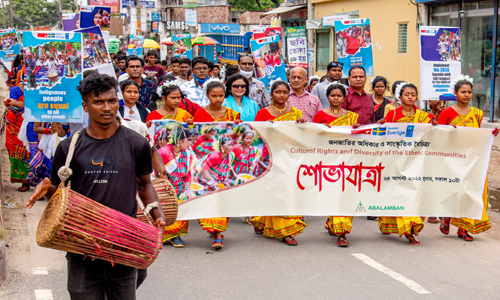
People of Santal Community, chalkedout various programmes in the district on Wednesday demanding the protection of their language, heritage and culture.
In the morning around 11 AM, a shovajatrawas brought out from the auditorium of ZilaShilpakala Academy and ended at the same venue after parading the main roads of the town.
Then, a discussion meeting was held at the auditorium of the academy with executive director of Abolamban, ProbirChakrabartee in the chair.
Presidentof district UdichiShilpigosti Md. JahurulQaiyum, Minority expert of UNDP-human rights minority program Shankar Pal, youth leader of Pahari Community Mallicka Rani Pahari and youth leader of Santal Community MoonicaMardy addressed the function among others.
The speakers in their speeches said 40 lakh tribal people live in the country and many of them live in the plaine land and use around 50 languages to express their feelings.
The language-literature-culture of the indigenous people was almost endangered today due to the neglect of the main community and the lack of state initiative, they also said
Some have already disappeared so far, they added.
In this context, they demanded of the government to take necessary step to protect the language, heritage and culture of the indigenous people including santal community to build a disparity free nation.
They also demanded of the government to bring the indigenous people under the main stream of the development of the government.
Additional deputy commissioner-General Shusanto Kumar Mahato in his speeches said the government is so much cordial and active for overall development of the indigenous people of the country.
Taking this view, the district administration is constructing cultural academy at Katabar, the santal habituated area of the district to protect their language, heritage and culture, he concluded.
Later, a colorful cultural function was also held to entertain the participants.
A large number of santal men wearing their traditional dress participated in the programs.
All programs were held at the management of Abolamban with the financial support of UNDP Human rights program funded by the Switzerland and Sweden embassies